June 9, 2016
A Pile of Poetry

I attended the Griffin Poetry Prize readings last week, which was so much huger and more excellent and enjoyable than anything I’d ever expected. Afterwards, I couldn’t help but buy books because each of the readers had been so compelling, the poetry itself so arresting, though I congratulated myself on not buying all the books. And then in the morning I couldn’t help but go online and order just one more… Adding to the huge stack of poetry that I’ve been reading this spring, books that have been occupying my senses for a few months now. Most I’ve not motored through, but have have been making my way through slowly, not even in order sometimes. It was been such a pleasure exploring these books, their stories and their language, and while I find it difficult to write about poetry sometimes (and I actually find it difficult to *everything* about poetry sometimes) I wanted to write some of my thoughts down here.
 Sharon McCartney, Metanoia: I loved McCartney’s The Love Songs of Laura Ingalls Wilder, and this new collection is something entirely different, while I loved it too. I heard McCartney read from it in March at the Biblioasis launch, and this experience brought the disparate pieces of the project together for me. This long poem connects with a trend with many books I’ve read toward fragmented pieces that blur the lines between fiction and autobiography, this one concerned with the end of a marriage and the end of a love affair, as well as various other concerns.
Sharon McCartney, Metanoia: I loved McCartney’s The Love Songs of Laura Ingalls Wilder, and this new collection is something entirely different, while I loved it too. I heard McCartney read from it in March at the Biblioasis launch, and this experience brought the disparate pieces of the project together for me. This long poem connects with a trend with many books I’ve read toward fragmented pieces that blur the lines between fiction and autobiography, this one concerned with the end of a marriage and the end of a love affair, as well as various other concerns.
 Suzanne Scanlon, Her 37th Year: An Index: I’m so grateful to Sarah’s beautiful blog post which not only introduced me to this book and inspired me to buy it, but also showed me how to read it. I’m currently midway through the alphabet, but enjoying piecing together the narratives contained within and also delighting in the sentences.
Suzanne Scanlon, Her 37th Year: An Index: I’m so grateful to Sarah’s beautiful blog post which not only introduced me to this book and inspired me to buy it, but also showed me how to read it. I’m currently midway through the alphabet, but enjoying piecing together the narratives contained within and also delighting in the sentences.
 Susan Holbrook, Throaty Wipes: Speaking of delight. I loved Holbrook’s previous collection so much (with its long poem about breastfeeding in particular) and have been looking forward to this one. It’s proven to be just as fun, playful, weird and enjoyable as the other. I especially loved her poem “8 ate…” with its lines (as my eldest daughter turned seven and my own 37th birthday approaches): “Who/ can remember if/ we’ve turned thirty-seven,/ maybe forty-nine already./ But she who still counts/ her age on her fingers/ curls them to individual/ numbers as to singular/ monkey bars. For a year/ she stand at the prow/ of seven, lead sharpened/ by the Swiss Army. shark fin,/ bared tooth, even as hers/ hail down.”
Susan Holbrook, Throaty Wipes: Speaking of delight. I loved Holbrook’s previous collection so much (with its long poem about breastfeeding in particular) and have been looking forward to this one. It’s proven to be just as fun, playful, weird and enjoyable as the other. I especially loved her poem “8 ate…” with its lines (as my eldest daughter turned seven and my own 37th birthday approaches): “Who/ can remember if/ we’ve turned thirty-seven,/ maybe forty-nine already./ But she who still counts/ her age on her fingers/ curls them to individual/ numbers as to singular/ monkey bars. For a year/ she stand at the prow/ of seven, lead sharpened/ by the Swiss Army. shark fin,/ bared tooth, even as hers/ hail down.”
Soraya Peerbaye, Tell: Poems for Girlhood: was the collection I bought the day after The Griffin Readings, after listening to Peerbaye had brought tears to my eyes, with a reference to “Forever Young”, by Alphaville, no less. Read Sonnet L’Abbe’s excellent piece on Peerbaye’s collection and how it was inspired by the murder of teenager Reena Virk, and how Peerbaye underlines the racial aspects of this crime as other writers haven’t done. The book arrived in the mail on Tuesday afternoon, and that night I sat down and read it all in one go. It was amazing.
 Louise Bernice Halfe, Burning in this Midnight Dream: I think I first learned of Halfe’s work when Lee Maracle spoke about her on The Current on First Nations writers, and women First Nations writers in particular and how so many of these are under-appreciated. Halfe’s first collection was nominated for most of the top poetry prizes in the country when it was published in 1998. This new collection is about her own experiences of Truth and Reconciliation as she writes of her experiences at residential schools and also of her own painful family history. As Paulette Regan writes in the book’s introduction: “There are many pathways to reconciliation. Poetry is one.”
Louise Bernice Halfe, Burning in this Midnight Dream: I think I first learned of Halfe’s work when Lee Maracle spoke about her on The Current on First Nations writers, and women First Nations writers in particular and how so many of these are under-appreciated. Halfe’s first collection was nominated for most of the top poetry prizes in the country when it was published in 1998. This new collection is about her own experiences of Truth and Reconciliation as she writes of her experiences at residential schools and also of her own painful family history. As Paulette Regan writes in the book’s introduction: “There are many pathways to reconciliation. Poetry is one.”
 I’ve been looking forward to Alexandra Oliver’s new collection, Let the Empire Down, following up her award-winner Meeting the Tormenters in Safeway, which I loved. The new book doesn’t disappoint, another collection of biting, sometimes funny and usually brutal poems about modern life and its horrors and absurdity, about motherhood and daughterhood, and all the things that once were that will never be again.
I’ve been looking forward to Alexandra Oliver’s new collection, Let the Empire Down, following up her award-winner Meeting the Tormenters in Safeway, which I loved. The new book doesn’t disappoint, another collection of biting, sometimes funny and usually brutal poems about modern life and its horrors and absurdity, about motherhood and daughterhood, and all the things that once were that will never be again.
 I have loved making my way through Carolyn Smart’s collection, Careen, which reimagines the story of Bonnie and Clyde via primary sources that tell it so much less cinematic. I love the way that language can so perfectly convey the momentum of the story, its speed and all the getaways, and also all the different voices. (You can read the poem, “Proud Flesh,” here.
I have loved making my way through Carolyn Smart’s collection, Careen, which reimagines the story of Bonnie and Clyde via primary sources that tell it so much less cinematic. I love the way that language can so perfectly convey the momentum of the story, its speed and all the getaways, and also all the different voices. (You can read the poem, “Proud Flesh,” here.
 We’re reading Never Mind, by Katherine Lawrence, for my book club next week. Truthfully, it’s the collection I’ve struggled with the most out of all of these, so much of the meaning rooted in language instead of story, which is how I find my way into most books. I also have an aversion to nineteenth century settler tales. Further I keep picking it up when I am tired and it makes my eyelids start to droop. It’s demanding more than I feel like giving any book at the moment—but there is goodness here too. There is humour and subversion and a powerful female voice. Look forward to delving deeper via next week’s conversation.
We’re reading Never Mind, by Katherine Lawrence, for my book club next week. Truthfully, it’s the collection I’ve struggled with the most out of all of these, so much of the meaning rooted in language instead of story, which is how I find my way into most books. I also have an aversion to nineteenth century settler tales. Further I keep picking it up when I am tired and it makes my eyelids start to droop. It’s demanding more than I feel like giving any book at the moment—but there is goodness here too. There is humour and subversion and a powerful female voice. Look forward to delving deeper via next week’s conversation.
 I loved Lisa Bird-Wilson’s award-winning short story collection, Just Pretending, and so have been looking forward to her debut poetry collection, The Red Files. I’m partway through it now and enjoying it so much, although enjoying isn’t quite the right word for work that’s so harrowing. In these poems, Bird-Wilson takes photographs and other records of residential schools and beautifully imagines narratives, the people behind the official history, their names and stories. She also includes notes from official records and recontextualizes these pieces in a way that’s similar to Peerbaye’s use of transcripts from criminal trials.
I loved Lisa Bird-Wilson’s award-winning short story collection, Just Pretending, and so have been looking forward to her debut poetry collection, The Red Files. I’m partway through it now and enjoying it so much, although enjoying isn’t quite the right word for work that’s so harrowing. In these poems, Bird-Wilson takes photographs and other records of residential schools and beautifully imagines narratives, the people behind the official history, their names and stories. She also includes notes from official records and recontextualizes these pieces in a way that’s similar to Peerbaye’s use of transcripts from criminal trials.
 I bought 40 Sonnets, by Don Paterson, right after the Griffin Readings, because he was brilliantly funny and read the poem, “Power Cut,” about being stuck in an elevator, and it was powerful and glorious—and contained a reference to a dumbwaiter. This collection also won the 2016 Costa Poetry Award. I know Peterson is more established than she is, but reading this book finally gave me context as to what Alexandra Oliver is up to—I don’t read many poets like this who utilize traditional forms and metre and rhyme. I really, really like it.
I bought 40 Sonnets, by Don Paterson, right after the Griffin Readings, because he was brilliantly funny and read the poem, “Power Cut,” about being stuck in an elevator, and it was powerful and glorious—and contained a reference to a dumbwaiter. This collection also won the 2016 Costa Poetry Award. I know Peterson is more established than she is, but reading this book finally gave me context as to what Alexandra Oliver is up to—I don’t read many poets like this who utilize traditional forms and metre and rhyme. I really, really like it.
 Conflict Resolution for Holy Beings, by Joy Harjo, was another Griffin Prize nominee, and I too bought this book after her incredible reading. Poems like “Indian Night School Blues” and “We Were There The Night Jazz was Invented.” I’m not far into this collection, but I like it a lot. You can read “Talking With the Sun” here—it’s beautiful.
Conflict Resolution for Holy Beings, by Joy Harjo, was another Griffin Prize nominee, and I too bought this book after her incredible reading. Poems like “Indian Night School Blues” and “We Were There The Night Jazz was Invented.” I’m not far into this collection, but I like it a lot. You can read “Talking With the Sun” here—it’s beautiful.
 Excerpts from all the Griffin-nominated collections are contained within The 2016 Griffin Poetry Prize Anthology—a most excellent keepsake. Not wholly redundant, even if I end up buying every single one of the nominated books themselves.
Excerpts from all the Griffin-nominated collections are contained within The 2016 Griffin Poetry Prize Anthology—a most excellent keepsake. Not wholly redundant, even if I end up buying every single one of the nominated books themselves.
June 8, 2016
#TodaysTeacup Tragedy
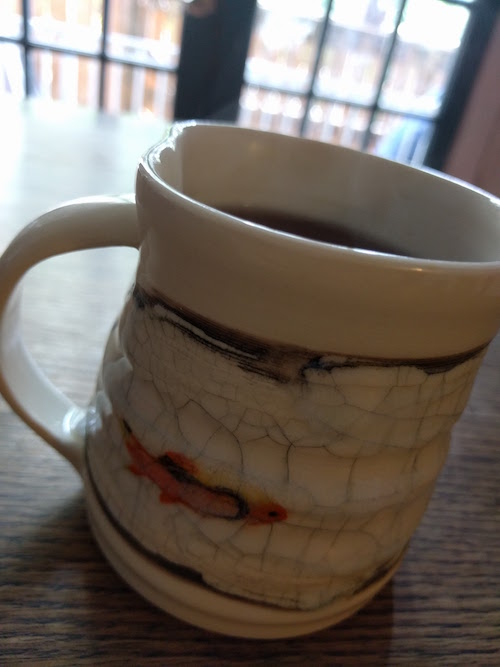
#TodaysTeacup took a turn for the tragic on Monday when I dumped its contents onto my laptop. It took a few moments to process what had happened, and the computer still appeared to be functioning as I poured tea out of it—perhaps, I pondered, we could pretend this never happened? But then the trackpad stopped working, and the keyboard was messed up. I managed to turn the computer off finally, but I should have done it faster. And for two days now it’s been sitting on a drying rack, a fan blowing underneath it. We managed to boot it up this morning and at first it seemed I might be saved…but alas. The keyboard and mouse appear to be fried, the wireless wasn’t working. The computer seems well on its way to being kaput. Thankfully, I am now a devout user of Dropbox so most important things were saved….except for the few documents I slapped onto my desktop somehow imagining they were more accessible there. My enterprising husband grabbed a USB key and transferred a first draft of a new fiction project (that just hit 20,000 words last week) which I am glad has been saved, though rewriting it might have been a blessing in disguise. I’ll have to do it soon enough anyway. Nothing is lost then, except the money I will need to spend on a new laptop, which is annoying, but my accountant will be grateful actually, because I have so few business expenses it’s ridiculous. (This is what happens when your office is your couch.) And it’s a justified expense, because my computer is so essentially to almost everything I do. Being without it these last few days has felt very strange, and it’s reoriented my week, which was supposed to be very very busy as I got ahead of myself on a few bits before school lets out and I lose my childcare for the summer, and have to begin working in the evenings again. But instead, I’ve spent my evenings reading—last night I read Tell, by Soraya Peerbye, who I heard read at the Griffin Readings last week and whose incredible book I read in one sitting. I’m also reading The Naturalist, by Alissa York, and really enjoying it, plus I finished the third book in Steve Burrows’ Birder Murder series, A Cast of Falcons, the other day and it was fantastic. Coming up is Thirteen Shells, by Nadia Bozak, and We’re All In This Together, by Amy Jones. Must keep on reading these Spring 2016 books like a hurricane, because Fall 2016 (the literary one—it falls earlier than the seasonal one) will be here before we know it. And in the meantime, I’m grateful to Stuart who is letting me use his laptop (even with my track record—I am lucky, for sure) and who has only been kind and sympathetic about something that is entirely down to my own stupidity. Although everyone is stupid sometimes.
June 6, 2016
The people we used to be
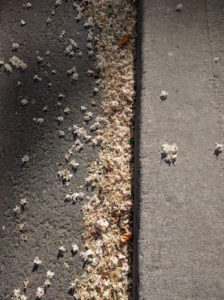 I was crossing the street in April when I heard somebody calling my name. I turned around to see a familiar face, a friendly one, but I couldn’t quite place it. My first instinct was that this was my best friend from grade 7, but as we spoke I realized it wasn’t her after all. This woman had a different job, a different narrative, it emerged. But I’d greeted her with such familiarity, that she had no idea I was confused. We kept on talking, and then finally I realized that it was my friend’s younger sister, who I hadn’t seen or spoken to in about twenty years, though our parents in our hometown kept tabs on our whereabouts. I knew a bit about what she’d been up to and we reconnected for a few minutes, and she informed me that her sister, my friend, was about to have her first baby, had gotten married, had found herself in a pretty nice place in her life.
I was crossing the street in April when I heard somebody calling my name. I turned around to see a familiar face, a friendly one, but I couldn’t quite place it. My first instinct was that this was my best friend from grade 7, but as we spoke I realized it wasn’t her after all. This woman had a different job, a different narrative, it emerged. But I’d greeted her with such familiarity, that she had no idea I was confused. We kept on talking, and then finally I realized that it was my friend’s younger sister, who I hadn’t seen or spoken to in about twenty years, though our parents in our hometown kept tabs on our whereabouts. I knew a bit about what she’d been up to and we reconnected for a few minutes, and she informed me that her sister, my friend, was about to have her first baby, had gotten married, had found herself in a pretty nice place in her life.
So naturally I went home and googled my friend and her husband’s name, and I found them on Instagram. And since then it has been really nice to get a glimpse into her life and to provide her a glimpse into mine, because while we drifted apart when we went to different high schools, throughout grades seven and eight, she meant a whole lot to me. Our friendship was hugely formative. We were two weird and awkward adolescent girls, but we were weird and awkward in such complementary ways—both of us had our eyes on bigger prizes in life, though we didn’t know what they were yet. Both of us were utterly unimpressed with popular culture at the time (and for good reason—this was 1991) and obsessed with nostalgia. We used to listen to “American Pie” over and over again, and feel like something essential was forever lost to us. I was crazy about the Beatles and wanted to be a hippie, someone bohemian, and my friend had a bit of that bent herself—her parents weren’t into materialism, and I recall that she didn’t have cable or perhaps a TV, which was as radical as it got in the circles I travelled. What I don’t think we ever articulated but were forever circling around was longing, for the kinds of lives we’d heard about in songs our parents sang. I didn’t want to live a conventional life, but I was so conventional, I didn’t even know how to go about articulating that.
And I can’t help but think how useful the internet would have been to a couple of funny girls like us. Yes, the internet and adolescent girls is a disaster, but not entirely. I recall how lonely it was to be a weirdo in 1991, to love old music and want to wear flowers in our hair. Yes, grunge was starting to happen, but we were sheltered, and we were never wild enough to do teenage rebellion proper. We weren’t grungy. There wasn’t any kind of culture out there that we knew about, that we could tap into, so we made our own instead, in the songs whose lyrics we memorized and analyzed, and the objects we revered, and all the things we talked about, the questions we tried to answer in circles. I recall we kept a notebook in which we wrote each other back and forth, and I remember lists like, “Things I want to be,” “Things I want to do.” I remember the goodness of a friend like that who made those things seem possible.
I sent my friend a message on Instagram this morning. I wrote to her, “Do you remember that 23 years ago today we went to see Paul McCartney play at Exhibition Stadium?” My dad took us. It was magical. I think the weather was terrible all day long, and then it wasn’t just in time, and then a guy offered us a free rickshaw ride. And then there was an actual Beatle on the stage, Paul McCartney promoting his album, “Off the Ground.” I have never felt so small in my life as I felt in that crowd, one of so many fans in the stadium, and Paul McCartney couldn’t see me—it was first time that it had occurred to me that he had no idea who I was. But I could see him, and it felt like I was engaging in something real for the first time in my life, a religious experience of a sort. I was part of something bigger than myself, and gave me an inkling that there could be a place in the world for a girl like me after all.
I didn’t get a reply from my friend. Not long after, a photo popped up on her husband’s instagram feed—their baby had arrived. On June 6, I marvelled to myself. How auspicious. It probably hasn’t occurred to her, but it means something to me, and how wonderful anyway, to paraphrase Joan Didion, to check back in once in a while with the people we used to be.
June 6, 2016
Globe Review: Kay’s Lucky Coin Variety
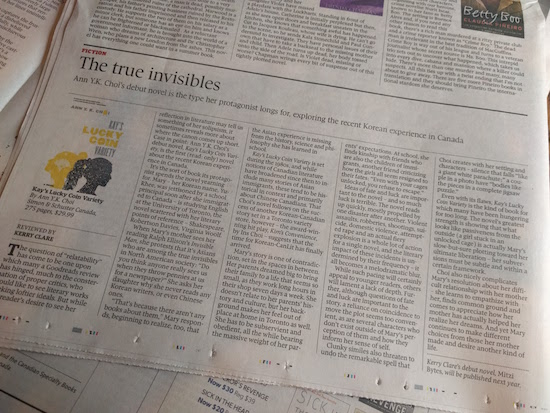
So grateful to the folks at Globe Books for the chance to review Kay’s Lucky Coin Variety, the debut novel by Ann Y.K. Choi, which appeared in the Globe and Mail on Saturday.
‘The question of “relatability” has come to be one upon which many a Goodreads review has hinged, much to the consternation of proper critics, who would like to see literary works seeking loftier ideals.
But while the reader’s desire to see her reflection in literature may tell us something of her solipsism, it sometimes reveals more about where the canon comes up short….’
June 5, 2016
Iris is Three
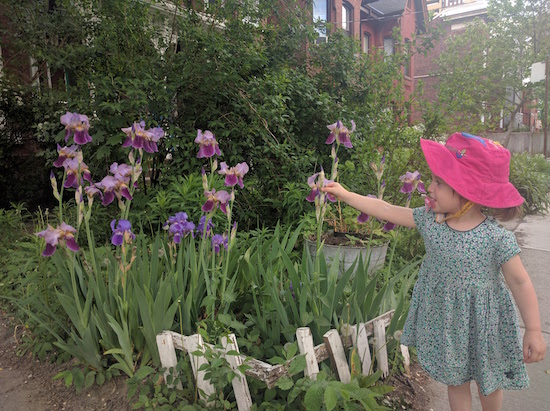
Our baby is three, which means she isn’t a baby. It’s her first time having a birthday where she’s aware of the occasion. “Is it my birthday?” she kept asking. “Right now?” We’re well tuned to birthdays at the moment because Harriet’s was just ten days ago, and it makes me think of the year that Iris turned one and one of her first words turned out to be “happy” because for about a month, it seemed like we sang Happy Birthday to You to someone every second day or so. But now she is three, and strings words together like beads on a string, and she’s got her own stories to tell—about her friends at school, and who pushed who, and who cried because there were raisins in the muffin at snack. She’s got her own little world that’s hers alone, and so staunchly belongs to it, and to herself, and she is quite unaware that this hasn’t always been the case. She knows that we were nothing before her. (“Thank you for coming to live with us,” I like to tell her, and I mean it.) As I was typing the preceding sentence, we heard Iris upstairs muttering to herself and then a thump as she climbed out of her crib and landed on the floor, the worst kind of thud shortly followed by the wailing, and this is what she’s like, reaching beyond her limits, trying to do it all herself, brave enough to jump, to climb. A human whirligig, and she’s fierce and maddening and rude and impetuous and she’ll bite you if you’re her sister, but we love her. We can’t help it. We fall for her charms, because she’s funny and smart and more stubborn than all of us put together, and we can’t stop trying to fathom her, even after it seems there is really no point. The way she ends conversations by saying, “See you next Monday!” and saying, “Pooks,” or when she scampers over, breathes in your ear, and whispers, “I burpted.” We like to joke that she’d be excellent on twitter, because she’s very good at outrage, always screaming at somebody. She likes to read the comic books her sister loves, never mind that she can’t read the words yet. At the moment, all she eats is cereal for breakfast and bagels and cream cheese of lunch, which is annoying but better than nothing. She loves Taylor Swift and singing, “Dancing on my own, has a very very mo,” which aren’t the right lyrics, I don’t think, but she isn’t bothered. Much of the time she is very very good, but when she is bad she is horrid. She used to have a charming three-tiered toy cake stand, until she smashed it in a rage, and that is Iris. Who is also excellent at baking—when she “helps” she actually does. She is much beloved by Harriet’s classmates and is quite accustomed to be being made a fuss of. She likes to dance, and play with her dolls, and draw pictures, and play whatever game her sister happens to be playing—though she can outplay her sister for hours these days, much to her frustration. Iris is kind and loving, and has a good time with her friends at school. When people are sad, she tries to comfort them. She can walk so far without slowing down. She can “read” Go Dog Go and the Elephant and Piggie books. She is fearless, full of fire, and we can learn a lot from her. If she doesn’t kill us first.
June 3, 2016
Tokyo Digs a Garden, by Jon-Erik Lappano and Kellen Hatanaka
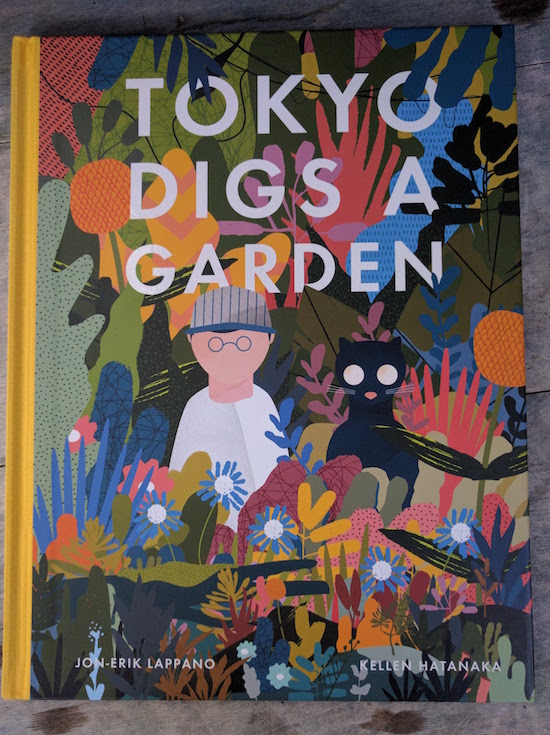
Tokyo Digs a Garden, by Jon-Erik Lappano and Kellen Hatanaka, doesn’t really make sense. It’s about a boy called Tokyo who has a cat called Kevin (who has vivid dreams about ice cream trucks). That it’s about a boy called Tokyo gives one a sense that the story takes place in Japan, and this is suggested by the illustrations, which are by Hatanaka, whose ethic origin is presumably Japanese. But then really, I’m not sure this is a story that takes place anywhere that’s literal. In fact, as suggested by a plot point hinging on a mysterious old lady distributing magic seeds, I’d say that Tokyo Digs a Garden is most certainly a fairy tale. And coupling such an old-fashioned form of story with a contemporary setting (cars, and elevators, and like) and Hatanaka’s new-fashioned illustrations shouldn’t necessarily work, but it totally does, resulting in an effect that is fantastic, weird, deep and textured, and, most wonderfully, a story for story’s sake.
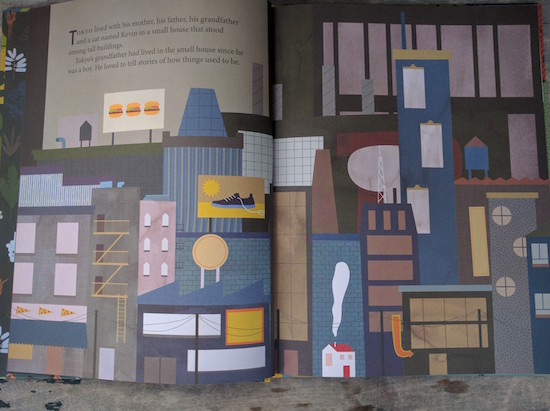
See the small white house with the red roof? That’s Tokyo’s house, and once that house was in the middle of a lush and verdant countryside, but then the city had eaten it all up.
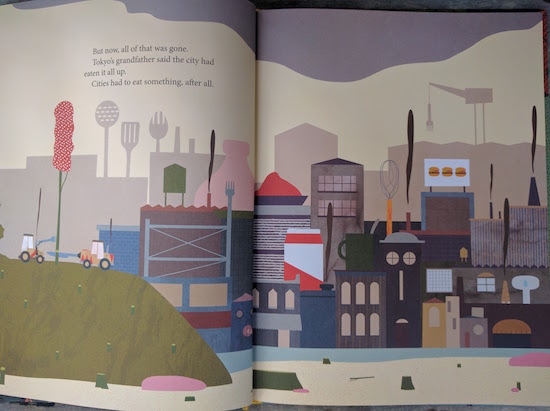
“City’s had to eat something after all,” Tokyo’s grandfather tells him, Hatanaka’s whimsical illustration playing with this idea, the city built of whisks and knives and forks and crockery and spatulas—and it’s a cityscape that reminds me of Maurice Sendak’s in The Night Kitchen.
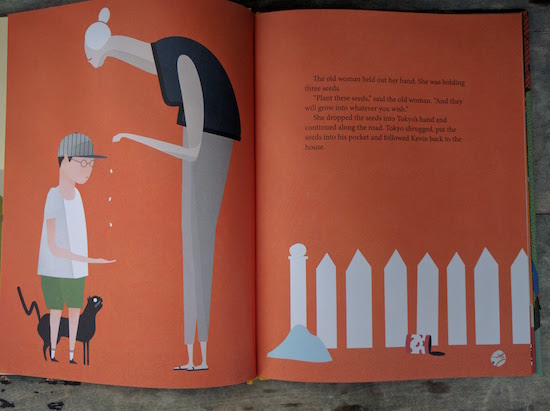
One day Tokyo and Kevin hear an ice cream truck and rush outside, only to discover no truck and no ice cream, but a very old woman riding a bicycle pulling a cart that’s filled with dirt. The cat’s disappointed, but Tokyo is intrigued to receive three seeds from the woman who tells him to plant them and the seeds will grow into whatever he wishes.
The next day, his grandfather informs him, is a good day for planting, and so Tokyo goes into his backyard (“where nothing is growing. Not even a weed”) and find a small patch of soil when he turns over a brick. He plants the three seeds and we don’t learn what he wishes, but that night he dreams he is a fox running through a forest. Kevin dreams of ice cream.
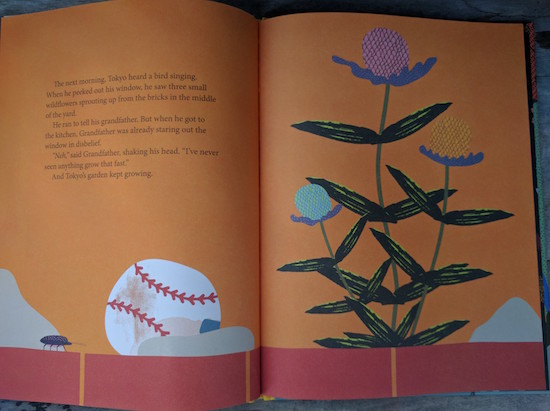
These are no ordinary seeds, of course, but you already knew that. The next morning wildflowers have sprung up between the cracks in the bricks. By the end of the day, there were trees, and by the next morning, “the garden had grown up and over the buildings, across the street, down the road, over the cards, and into the expressway.”
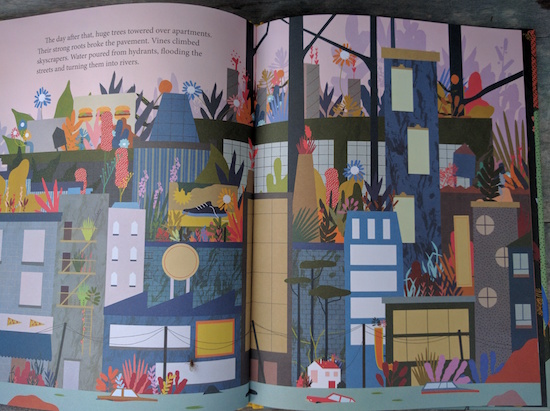
The wilderness grows and grows until vines climb the skyscrapers, roots are breaking the pavement, and the roads are rivers. “The day after that, the city was completely wild. / Deer foraged in office lobbies./ Rabbits burrowed in library carpets./ Bison stampeded through traffic lights./ Bears climbed telephone poles to search for honey where bees had made their hives.”
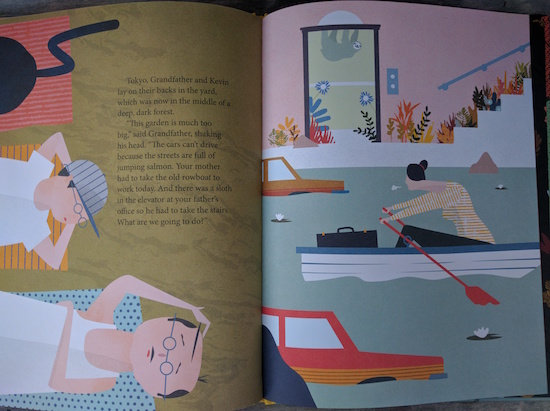 Underlying this, if one searches, there is some kind of environmental message: about the impact of humans on the environment, about extreme conditions caused by climate change, about the force of wilderness and wildness (which is already apparent in our neighbourhood in early June, as everything has turned so drastically GREEN and the weeds are already exploding) and how we think we are agents of this earth when we are in fact very much just a part of it. A small part. What I like about these ideas is that I’m not sure what the message is exactly—the searching is the point. Tokyo Digs a Garden is not an allegory. There are sloths in the elevator, which I don’t think is supposed to stand for anything but the sloth itself. There is no moral: “I think we’re just going to get used to it,” says Tokyo. “Gardens have to grow somewhere, after all.”
Underlying this, if one searches, there is some kind of environmental message: about the impact of humans on the environment, about extreme conditions caused by climate change, about the force of wilderness and wildness (which is already apparent in our neighbourhood in early June, as everything has turned so drastically GREEN and the weeds are already exploding) and how we think we are agents of this earth when we are in fact very much just a part of it. A small part. What I like about these ideas is that I’m not sure what the message is exactly—the searching is the point. Tokyo Digs a Garden is not an allegory. There are sloths in the elevator, which I don’t think is supposed to stand for anything but the sloth itself. There is no moral: “I think we’re just going to get used to it,” says Tokyo. “Gardens have to grow somewhere, after all.”
June 2, 2016
Going Out
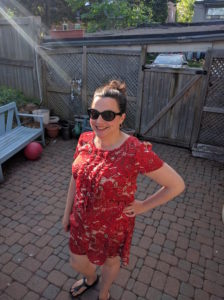 I went out last night and the night before. Next week or the week after, I’m out three nights in a row (although one of those nights is the Playschool Board meeting, which doesn’t really count as “out” out, but still…) I was out (in Montreal!) last Friday. This spring, I’ve gone to various book launches and other events, and it has been really wonderful. A reawakening. Truly spring-like. Because last fall (and previous falls, and springs for that matter) I have been oh so very tired. There were things I wanted to go to, but summoning the energy to leave the house at the end of the day just seemed like too much trouble. I worried a little for my sanity: was I really so antisocial? “There is nothing I’d rather do than stay home reading a book in my pyjamas,” I kept saying, which is still a little bit true, but not the whole story anymore. And I really didn’t know it could be like this, but I suppose this is what comes of broken sleep for three entire years. Last fall I was so exhausted I could barely scrape myself off the floor at the end of the day, and looking back now it really does seem inevitable that I was on the highway to pneumonia (which is like the danger zone, but less sexy, with a whole lot more mucous). Having pneumonia is the strangest thing that ever happened to me, except for being pregnant, but the experiences were similar, both in which I seemed to lose ownership of my body entirely. From where I stand now (actually upright!) it’s a whole point of fascination. One I like to consider now as I’m darting about the city from one place to another wearing snappy high heels. Ha ha, just kidding. Obviously, I’m always wearing flip-flops.
I went out last night and the night before. Next week or the week after, I’m out three nights in a row (although one of those nights is the Playschool Board meeting, which doesn’t really count as “out” out, but still…) I was out (in Montreal!) last Friday. This spring, I’ve gone to various book launches and other events, and it has been really wonderful. A reawakening. Truly spring-like. Because last fall (and previous falls, and springs for that matter) I have been oh so very tired. There were things I wanted to go to, but summoning the energy to leave the house at the end of the day just seemed like too much trouble. I worried a little for my sanity: was I really so antisocial? “There is nothing I’d rather do than stay home reading a book in my pyjamas,” I kept saying, which is still a little bit true, but not the whole story anymore. And I really didn’t know it could be like this, but I suppose this is what comes of broken sleep for three entire years. Last fall I was so exhausted I could barely scrape myself off the floor at the end of the day, and looking back now it really does seem inevitable that I was on the highway to pneumonia (which is like the danger zone, but less sexy, with a whole lot more mucous). Having pneumonia is the strangest thing that ever happened to me, except for being pregnant, but the experiences were similar, both in which I seemed to lose ownership of my body entirely. From where I stand now (actually upright!) it’s a whole point of fascination. One I like to consider now as I’m darting about the city from one place to another wearing snappy high heels. Ha ha, just kidding. Obviously, I’m always wearing flip-flops.
June 1, 2016
Listen to me on the radio!
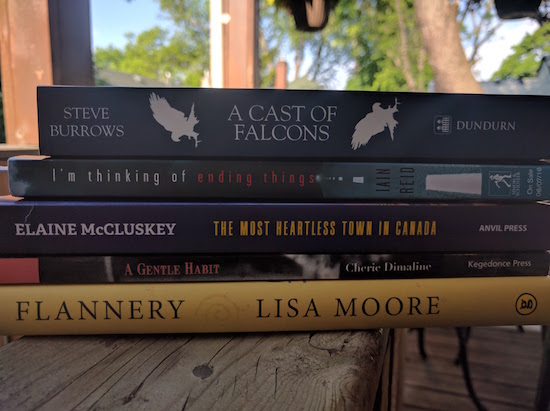
If you didn’t hear my book recommendations today on CBC Ontario Morning, you can listen to them here (at around 41 minutes). I love each of these books so thoroughly, and was so pleased to be able to talk about them. Although I am very sorry for getting Cherie Dimaline’s last name wrong and for confusing her First Nation. She is in fact from a Metis community on Georgian Bay. And you should definitely read her book, A Gentle Habit—it’s terrific. The other books were A Cast of Falcons, by Steve Burrows; I’m Thinking of Ending Things, by Iain Reid; The Most Heartless Town in Canada, by Elaine McCluskey; and Flannery, by Lisa Moore.
June 1, 2016
Little Labors, by Rivka Galchen
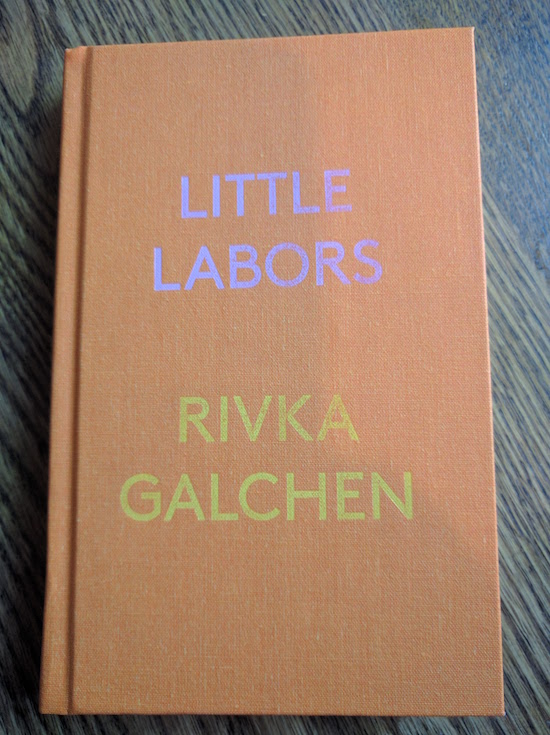
My littlest and lastest child turns three on Sunday, which means that we no longer have a baby. I sleep all night and in the morning the only people in my bed are the people who are supposed to be there. Everyone in our household uses the toilet. My husband and I go out often and leave our children with a babysitter. On Friday, I left my family for twenty-four hours and they got along perfectly well without me, all of which are details that might seem perfectly mundane, but we’ve had to come a long way to get here. And with my children being (very deliberately) four years apart, I didn’t even suffer babies with the perfect intensity that other women do (and some of them don’t even call it suffering!). I went out for dinner last night with my friend who had three under two—she’s still recovering. It was seven years ago, but I still recall quite vividly how becoming a mother blew my universe apart.
And sometimes I think I’m over it. While in the years after Harriet was born, I was entirely preoccupied with the politics of motherhood, these ideas don’t fascinate me the way they once did. I’m interested in Suzanne Buffam’s The Pillow Book because of the narrative possibilities that motherhood has to offer literature, structurally speaking, and also because it was very good and surprising, but not because mothers and motherhood aren’t inherently interesting to me anymore. Never mind that I edited an entire book about them (which I still think is pretty damn interesting, but still). As other women become mothers and are discovering the uncanny strangeness and unfathomability of the motherverse for the very first time, I have to remind myself to be patient with them, with their fascinations. Just like other women were patient with me, as I was thinking these thoughts as though I were the first woman to ever think them.
“…and so after I had the baby, I found myself in the position (now interested in babies) of those political figures who come to insights others had reached decades ago only after their personal lives intersected with an “issue,” like, say, Dick Cheney, with his daughter, who married a woman.” —Rivka Galchen, Little Labors
All of which means that I didn’t really think I needed to read Rivka Galchen’s Little Labors. I’d read Buffam’s book two weeks ago anyway, another book born out of new mother panic. Also informed by Sei Shonagon’s The Pillow Book, from eleventh century Japan. But then the New York Times review of Galchen’s book was most intriguing. And then I actually saw the book, which is this gorgeous little package that fits perfectly in your pocket or your tiny purse, and I just had to have it. I started reading it on the flight home from Montreal, and fell totally, completely in love.
Imagine then Buffam’s book, but written by an acclaimed prose stylist instead of a poet. Each piece is a mini essay on motherhood, womanhood, the nature of babies, the nature of babies in literature, and how women relate to each other, and to the world, and about how going about the world with a baby is an altogether different experience than being without one. The pieces are terrifically funny, rich with surprising insights, and disclosing just the right details while withholding enough to maintain an element of mystery. (In the very first essay I ever published about motherhood, for example, I am shining a flashlight into my vagina within the first few paragraphs. Rivka Galchen never does this. Or at least if she does, she doesn’t let us know.) Sarah Ruhl in the Times writes of Galchen’s “sleight of hand—something only partially revealed — so that the fragments glow more.” (Presumably not with the aid of a flashlight.)
These fragments are preoccupied with the poster for a Keanu Reeves flop; the tiresome anecdotes we tell our friends about our babies presuming they’ll be interested (and once those friends have babies, they even actually are); a mention of the woman who drowned her five children; a horrible woman whom Galchen regularly encounters in her building’s elevator who has strong feelings she must articulate about her baby’s size; on head shapes, their remarkability and otherwise; about troubling proclivities toward orange; one piece beginning, “Literature has more dogs than babies, and also more abortions.”; about Frankenstein, Godzilla, Rumpelstiltskin, Lucille Ball, and The Tale of Genji (but not all in the same essay); about screen time, and what writers had children and who didn’t, and why writers’ children keep writing about closed office doors (and Galchen wonders why these doors are more troubling than the doors at Daddy’s work, downtown in a high rise building); about babies in art; and her complicated feelings about women’s writing and “women’s writing,” which she fascinatingly teases out.
New variety of depression: It’s true what they say, that a baby gives you a reason to live. But also, a baby is a reason that it is not permissible to die. There are days when this does not feel good.
Things that one was misleadingly told were a big part of having a baby: Diapers. Changing them. Bottles. Cleaning them. Wraps. Baths. Sleeplessness. Cheerios. All these things exist but rise to consciousness about as often as the apartment’s electricity does.






